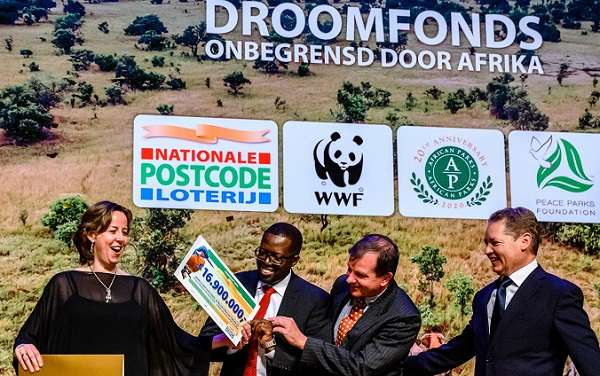
Kavango Zambezi transfrontier conservation area gets massive boost from Dutch grant

The ambitious plans for the Kavango Zambezi (KAZA) transfrontier conservation area received a massive boost when the Dutch postcode lottery announced it will support the venture with a whopping €16.9 million. At an exchange rate of 20 to 1, this translated to more than N$300 million.
The grant was awarded this week Wednesday, 04 March, at a gala banquet in Amsterdam to the World Wide Fund for Nature, the Peace Parks Foundation and African Parks. The donor is the Dutch entity, the ‘Nationale Postcode Loterij’.
KAZA is located between the Okavango and Zambezi rivers covering vast tracts of land in Angola, Zambia, Zimbabwe, Botswana and Namibia. The intention is to start from so-called core conservation areas and then systematically expand the concept to include other protected areas. This will include large areas where there are substantial human settlements. The ethos of the KAZA concept is that it will provide protection to wildlife as a means of generating revenue from tourism. This income, in turn, will support the communities living in KAZA.
The three fund recipients are leading conservation organisations who have come together for this vast project to assist partner states with the process to take KAZA from an idea on the drawing board to a functional reality. At this stage, KAZA is only defined by the multi-lateral treaty between the five host countries.
The KAZA Secretariat’s Executive Director, Dr Nyambe Nyambe, stated: “We were very excited to receive this good news. KAZA is firmly anchored on the spirit of partnership. The collaboration between the three conservation NGOs and KAZA partner states in securing the Dream Fund support is a true testimony of this. On behalf of all the partners the KAZA Secretariat extends our sincerest gratitude to the players of the Dutch Postcode Lottery, who have provided the catalyst for partnerships that will generate real impacts for people and conservation within the KAZA landscape.”
WWF, Peace Parks and African Parks, working closely with the KAZA Secretariat, will combine their unique strengths in an integrated approach focused on three core activities: developing safe havens, establishing connectivity through ecological corridors, and securing healthy rivers and catchment areas for the provision of fresh water. Part of the funding will also be used to strengthen the KAZA Secretariat’s capacity.

A key pillar is to develop important habitat ranges for elephants and securing the safe passage of the free-roaming elephants, and other wildlife, between these safe havens, while providing a viable livelihood for communities living along these corridors.
The KAZA Secretariat stated that this project is not focussed on short-term gains or pursuing conservation goals in isolation. Through inclusive collaboration, the shared vision is to transform KAZA into a climate resilient landscape that sustains harmonious living between humans and nature, leveraging a wildlife economy that is based on enhancing the value of natural resources and providing for the growth needs of the 2.5 million people that live in these areas.
More information on KAZA can be obtained from Dr Nyambe by sending a mail to [email protected].











































